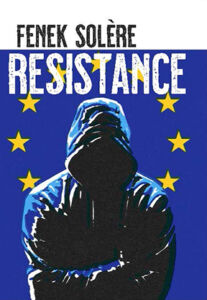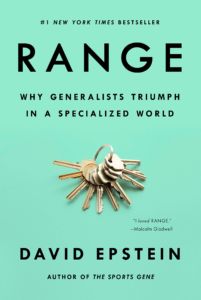Put Many Tools into the Toolbox
Posted By Morris van de Camp On In North American New Right | Comments DisabledDavid Epstein
Range: Why Generalists Triumph in a Specialized World
New York: Riverhead Books, 2019
No Tool is omnicompetent. — Arnold Toynbee
[W]ork that builds bridges between disparate pieces of knowledge is less likely to be funded, less likely to appear in famous journals, more likely to be ignored upon publication, and then more likely in the long run to be a smash hit in the library of human knowledge. — David Epstein
Tiger Woods became a top golfer because he started playing the sport as soon as he started walking and kept at it until he became a master. This led to a flurry of parental interest in the idea that 10,000 hours of practice can make anyone a master provided that they apply themselves and put in the requisite hours. A book that pushes this idea is called The Battle Hymn of the Tiger Mother by an Oriental woman, Amy Chua.
David Epstein [2], a writer for Sports Illustrated and ProPublica, took a look at that idea and found that early specialization rarely produced success at the rate one would suspect. What usually happens is that the early specialist burns out and changes careers. In other cases, groups of specialists were more likely to misidentify problems, fail to achieve a breakthrough, or stubbornly cling to a half-true dogma. For their part, the late starters — those who tried many things while young — often achieve great successes.
Epstein examines why this is the case in his book Range. One observation he makes is merely common wisdom, but it must be repeated: Creativity is difficult to nurture, but easy to thwart. Creativity is important for every endeavor, from music to sports to science. Creativity is best nurtured by a person trying out different things before finally specializing.
The most evidence for this is found in the difference between English and Scottish university students. English students are encouraged to specialize early, while Scots are encouraged to get a broad education. Later in their careers, the English specialists often retool and do something else. The Scots start later, but once they’ve found a tolerable niche, they keep at it. Thus, they gain seniority and bigger wages over time.
Patterns of Thought
A good part of why generalists thrive over specialists is that their varied interests allow for a cross-pollination of one skill to another. The greatest musicians of the Baroque era were women who were put into a Venice orphanage as babies and raised to play different musical instruments. These women were often the children of prostitutes, had no powerful familial connections, and were not particularly attractive, but they ended up being the best musicians in the world. It was their varied experiences that made them so good.
This varied training turns out to be a big plus, and it can be applied to education more generally. There are two methods of instruction that a student can use. The first is “interleaving,” the second is block learning. In block learning, a student learns in a rational sequence: ABCD EFGH IJKL, and so on, but in interleaving a student learns A2YZ BQ7S CED5, etc. The first method has the appearance of working better; it is considerably less frustrating for the student. The second, where wildly different items are presented up front, is more frustrating, but it allows for deep learning. It creates a scaffolding upon which specialized knowledge can later be emplaced. According to Epstein:
Whether the task is mental or physical, interleaving improves the ability to match the right strategy to a problem. That happens to be a hallmark of expert problem solving. (p. 96)
At the US Air Force Academy, researchers found that the most unpopular teachers were the ones who used interleaving, but they also turned out to be the best in the long run. The cadets really got to know the material and were able to apply it properly later.
 [3]
[3]You can buy Fenek Solère’s Resistance here. [4]
Another part of creativity is the use of the right analogy. There are some pitfalls, however: Epstein found that students of international diplomacy would argue for war if the hypothetical scenario was something like the Second World War, but argue for negotiation and caution if the analogy was like Vietnam. Obviously, not every diplomatic situation is like the Second World War and Vietnam, but the right analogy can be very effective.
The astronomer Johannes Kepler worked out the laws of interplanetary motion by means of analogy. He measured the orbits of the planets at a time when the Ptolemaic — Earth at the center — model of the solar system was giving way to the Copernican –Sun at the center — model. He assumed that the motions of objects on the Earth were like those of the planets. His critical discovery was when he found that a planet was not moving in the way predicted. Instead of assuming his measurements were wrong, he set out to discover why there was a delta, and from that astronomy made an enormous leap.
Outsiders
It is often people with an outside view who provide the critical input that solves a problem. Epstein gives several examples of people who were not medical professionals who made significant discoveries concerning rare diseases. Another person, who liked slushies and had spent merely a day helping a crew to pour concrete, figured out a method for recovering oil that had been spilled in cold seawater. He realized that cold oil had very similar properties to hardening concrete and a cold slushy, and by using a variant of a concrete vibrator, one could more easily recover the oil.
Since the arrival of the Internet, outsider views can be crowdsourced, and organizations such as NASA have solved problems that vexed them for decades by appealing to the general public. Specialists tend to get dragged down in the details and fail to see the connections between their own research and similar things elsewhere.
Lateral Thinking with Withered Technology
Another way in which a range of knowledge can lead to a breakthrough is by applying mature technology to new applications, or combining two mature technologies to create something new. The video game company Nintendo grew out of a small factory in Kyoto which had specialized in producing playing cards. In the 1960s the company was sinking in debt and losing market share to other games, so in 1965, its President hired Gunpei Yokoi. He was a Kyoto local and had been passed over for jobs at the highest levels of the Japanese economy.
Yokoi was underemployed, maintaining the machines that made the cards. He started to tinker with them, and eventually, the worried company President saw him make a gadget that he thought would sell. It became the Ultra Hand [5], and it became a bestseller. Nintendo started to clear its debt, and eventually Yokoi would create the Game Boy, another highly profitable product.
All of Yokoi’s products were simple. Game Boy was made up of very simple technology in comparison to its competitors, but it was durable, fun, small enough to take anywhere, and had a long battery life.
Kind vs. Wicked
Something that is vital as to why generalists with a broad range of skills are successful is that they take a two-sided view of professional environments. One view is of a kind environment; this is where the situation is stable and the rules are clear. The other environment is wicked; when the rules are unclear and might change, the next steps are not clear and there is no feedback.
In the real world, the environment is clearly wicked. There are few rules, they continuously change, and what one must do in the long run is often difficult to see. Having a range of skills and experience can be the ticket to success. And if you don’t yet have a range of skills, then get on a team whose members have a broad background.
* * *
Counter-Currents has extended special privileges to those who donate $120 or more per year.
- First, donor comments will appear immediately instead of waiting in a moderation queue. (People who abuse this privilege will lose it.)
- Second, donors will have immediate access to all Counter-Currents posts. Non-donors will find that one post a day, five posts a week will be behind a “paywall” and will be available to the general public after 30 days.
To get full access to all content behind the paywall, sign up here:
Paywall Gift Subscriptions
 [6]If you are already behind the paywall and want to share the benefits, Counter-Currents also offers paywall gift subscriptions. We need just five things from you:
[6]If you are already behind the paywall and want to share the benefits, Counter-Currents also offers paywall gift subscriptions. We need just five things from you:
- your payment
- the recipient’s name
- the recipient’s email address
- your name
- your email address
To register, just fill out this form and we will walk you through the payment and registration process. There are a number of different payment options.
